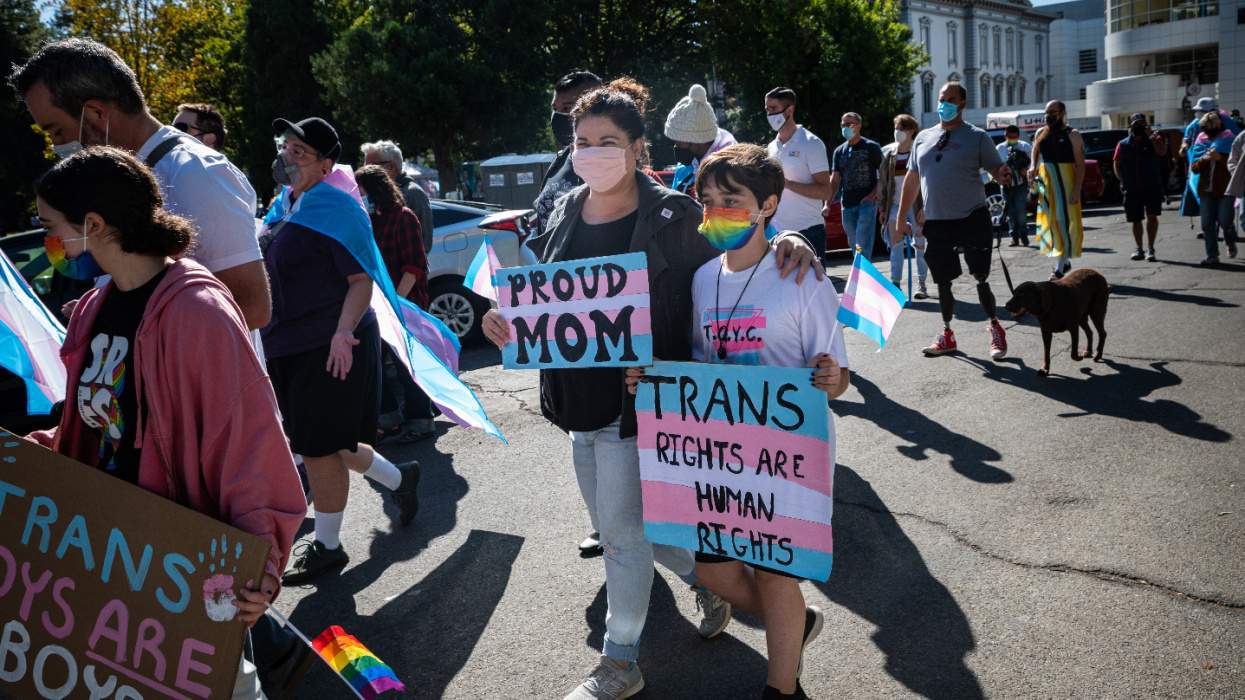A transgender boy in Tennessee is suing the state over its recently passed law barring trans students from playing on the sports teams matching their gender identity.
Luc Esquivel, a 14-year-old freshman at Farragut High School in Knoxville, is represented by Lambda Legal, the American Civil Liberties Union, and the ACLU of Tennessee in the suit, filed Thursday in U.S. District Court for the Middle District of Tennessee. His parents, Shelley and Mario Esquivel, are joining him in the suit.
"I was really looking forward to trying out for the boys' golf team and, if I made it, training and competing with and learning from other boys and improving my game," Esquivel said in a press release issued by the organizations. "Then, to have the legislature pass a law that singled out me and kids like me to keep us from being part of a team, that crushed me, it hurt very much. I just want to play, like any other kid."
"It made me, and still makes me, so angry," his mother added. "A mother wants to see their kid happy, thriving, enjoying being a kid. High school sports are an important part of that. I know how much Luc was looking forward to playing on the boys' golf team. It's heartbreaking to see him miss out on this high school experience, and it is painful for a parent to see their child subjected to discrimination because of who they are. I'm proud Luc is taking this step, and his father and I are with him all the way."
Gov. Bill Lee signed Senate Bill 228 into law in March, one of five anti-trans bills he's signed this year. A total of 10 states have enacted such bans -- eight this year and one last year by legislation, and one this year by executive order. This year has seen record anti-trans legislation introduced and passed, much of it focusing on school sports, but some dealing with minors' health care, restroom use, and other issues.
The rationale often given for the sports laws is that they are "protecting" girls' sports, with the claim that trans girls have an unfair advantage over cisgender girls, something that activists and scientists dispute. Some of the laws cover girls only but Tennessee's affects both boys and girls. In any case, all such laws are discriminatory, LGBTQ+ advocates say.
Luc Esquivel's case highlights the effect on boys. When playing on a girls' golf team, "it started to feel wrong because I did not feel like I fit in with them, even though they were all kind to me," he wrote in an article on the ACLU's website. "I felt out of place. It wasn't just that I wanted to wear pants when all the girls on the team wanted to wear skirts -- I felt awkward and knew this wasn't the team for me. I am a boy, and I want to be on the boys' golf team so I can play among other boys."
The Tennessee law "discriminates on the basis of sex and transgender status in violation of the right to equal protection guaranteed by the Fourteenth Amendment of the United States Constitution and Title IX of the Education Amendments of 1972," the suit says. It will also deny Luc Esquivel "equal educational opportunities and the multiple long-term benefits of participation in interscholastic athletics," the document continues. "And by singling out transgender students for exclusion, it will perpetuate discrimination against, and stigmatization of, transgender young people, and will exacerbate the already poorer mental health outcomes experienced by transgender youth as a result of such treatment."
Further, the law "was passed not to protect female athletes but to marginalize transgender people," according to the suit. "The law amounts to a bare desire to harm a politically unpopular group, which is an impermissible government purpose and fails any level of equal protection scrutiny."
The suit seeks a permanent injunction against the law and to have it declared unconstitutional. It asks for the Esquivel family's court costs and attorneys' fees to be covered as well. It names Gov. Lee as a defendant, along with several other state and local officials.
The states with anti-trans sports laws, besides, Tennessee, are Alabama, Arkansas, Florida, Idaho, Mississippi, Montana, Texas, South Dakota, and West Virginia. The laws in Idaho and West Virginia have been temporarily blocked by courts. Bills to this effect have been vetoed by the governors of Kansas, Louisiana, and North Dakota.















Charlie Kirk DID say stoning gay people was the 'perfect law' — and these other heinous quotes
These are some of his worst comments about LGBTQ+ people made by Charlie Kirk.